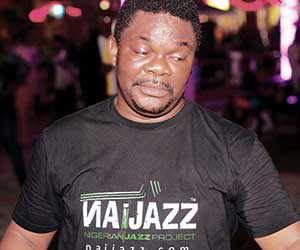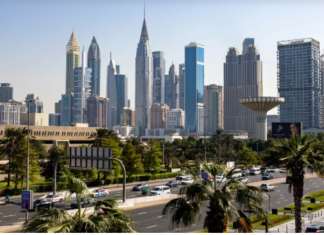Founder of Inspiro Productions, Ayoola Sadare, could have been a surgeon, but when his consultant dentist father died, his life took a new trajectory. He tells Assistant Life Editor, TERH AGBEDEH, the interesting story of his life from childhood in Apapa area of Lagos to organising the Lagos International Jazz Festival.
Where did this jazz thing all come from?
Jazz thing? Should I say where did the music thing come from?
Okay.
The music thing came from my dad (of blessed memory). He was a consultant dental surgeon, but he enjoyed music. In fact, he sponsored two bands during his lifetime. He bought equipment and a bus for them.
Which bands?
There is this guy from Olaje called Theophilus Iwalokun and then I think there is another guy called Akin Debo. He bought them musical instruments and he used to buy a lot of LPs, in the late 70s and early 80s.
What did your dad get out of this; did he share profit?
I don’t know how it was; I was very young then, so I didn’t know what the sharing formula was (laughter).
This was in the late 70s, so we are talking Fela Anikulapo-Kuti, Sunny Okosuns, Ebenezer Obey…
Name it, Suberu Onu and the Why Worry Orchestra, Ayinla Omowura, Oriental Brothers – Warrior.
Which part of Lagos was this?
I grew up in Apapa. He was a dentist there, a consultant surgeon in that area. So my early years were spent in Apapa.
Did you grow up alongside the famed Lebanese influence in Apapa?
Yes, you know Apapa is a seaport; so you had a lot of foreigners come in. So we had sailors. So, yes, there was a Lebanese influence, but I suppose a lot of other nationals lived there too. Apapa is an island too, so the bridge takes you out of the mainland into Apapa.
So the music influence started from that; listening to both indigenous and foreign musicians. Then jazz, all sorts. He bought and played all sorts of records and, you know, you are young, he tells you to go and play this on the turntable. The way he loved his music; he would open the windows and play it loud not only for himself to enjoy but for all to enjoy. So I suppose that is where the music started.
Apart from the music, what else do you remember fondly about Apapa and childhood?
Apapa was great. Apapa was like a training ground for me. The children nowadays are shielded; children of middle or upper middle class are shielded. But when we were growing up, though we were from the middle or upper middle class, we had some kind of liberty; we rode bicycles. There were parks.
How different is what you are doing now from what your dad did with the bands he funded?
It is different because this is full-time for me. For my dad, it was a hobby. So what I have decided to do is to, along the line, make business out of my hobby. I didn’t start promoting jazz and jazz-related music immediately. I studied microbiology in school.
Was it your dad who insisted you do that?
Yes, he wanted me to be a surgeon. So, the plan was that I go to the United States and do that. But before I finished in the university, he passed on and I suppose I thought: what do I really want to do? I then did a diploma in advertising, found out that I had a flair for graphic design and creativity so to speak. So, I took that line and found out later that I had the marketing flair.
But at what point did the music really start?
The jazz was 10 years ago. Of course, there was the church thing; attending church and finding out the music aspect; maybe you are involved with the choir or the music department. I found out that the time of the praise and the music was the attraction. It seems as if more people came for those events than even the normal Bible study or the prayer meeting. And music has this power that is universal and draws people in.
So that was for me, 10 years ago, in my advertising agency because then I could have said that I wasn’t even a promoter; I was running the agency.
It the agency still going?
Well, it is sub to what Inspiro is doing. I remember that then every year people would bring a design about going to watch a Cape Town International Jazz Festival that was called the North Sea Jazz Festival then. I would do designs for them and they would take a lot of Nigerians there who would spend three days and come back. In 2005, I was with another colleague who had been to the festival the year before in 2004 and met with the organisers and done interviews. Something just hit me; not even that I should go and see the festival, but that why can’t we have a jazz festival? It was like Eureka! An ‘aha’ moment. If it can happen in South Africa, it can happen here and, believe me, everything just worked to make that thing happen in that period. Where people were having difficulties getting a visa, we got a visa.
Looking back, do you think you would do the same thing if you had to do it again?
The thing is that I can’t imagine what I would have done if I had not gone to Cape Town. What direction would my life have taken? That was what I was supposed to do. In the last 10 years, I cannot imagine that I should have done something else. This is what I am wired for. This is what I love. This is what drives me.
You said some time ago that the dream you have for the Lagos International Jazz Festival could be likened to the success of the Glastonbury Festival. Would you say that you are close to achieving that dream?
Yes, it is getting close to fulfilment. We were in Cape Town in 2005, but we didn’t do the first Lagos International Jazz Festival until 2008. We got to Cape Town, got to meet the founder, Rashid, invited him and he came with his partner on their own expense to see the feasibility. Rashid said, on the three most important days of his life, some Nigerian calls him and that I was pestering him, that is the word to use, because I sent him emails, sent him texts that I wanted to meet him. He said the way I came at him, the workers in his office said if he does not attend to me, I would never let go (laughter).
Will he be here again?
Yes, he is going to be a special guest this year. Another thing is that he said the dream was to take the Cape Town International Jazz Festival all over Africa and they want to have footprints. And I said, this guy is speaking to me, this is prophetic.
When I got to Cape Town, it was more than what I expected. It was a dream come true, those were the most exciting days of my life.
Cape Town stands still when the festival is on. What do you think the South Africans are doing differently that makes them get sponsorship, for instance, that is hard to get here?
It is a different economy, exposure and experience. They might say that we are a bigger economy, but I think they are more sophisticated, so to say; maybe because of the influence of the visitors there who understand the need for recreation and holiday than we do here. When you are talking of marketing, they see the event not only from an entertainment point of view but also from a marketing experiential point of view, so a lot of companies want to bring their products there. I think it will get better in Nigeria.
Do you think jazz is music that will draw crowds here?
Yes; last year, we had about 10,000 people at our jazz festival. This year, we are expecting about 25,000. But I think it comes with experience and programming. Nigeria is a big market and everybody sees it except us. In a Lagos with 15 million to 20 million people, you can have 10 jazz festivals.
Will jazz sell? Yes, it will sell. A few years before we went to Cape Town, it wasn’t popular. Now it is popular because now you have Lagos International Jazz Festival, you have Lagos Jazz Series, there is Bayelsa and Calabar jazz festivals. So it is growing.
What are you doing differently this year?
We are adding another stage; we are having alternative stages. One thing we would love to do with the festival is to discover talents because I am passionate about new talents. We have talents in this country, and with the Lagos International Jazz Festival, I want to suppose that the international is not just the musicians we bring but in the way that we produce it using international standards and benchmarks to the best of our abilities with the lighting, equipment and sound. This year, we are going the extra mile by doing life streaming, so people all over the world can watch it.















